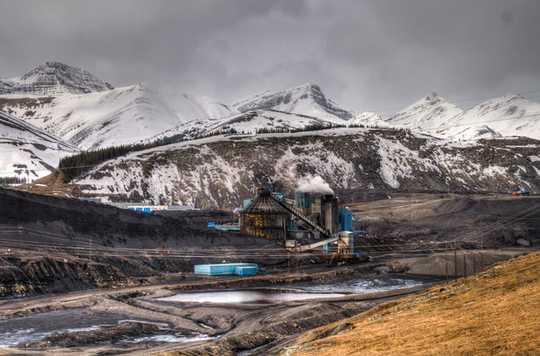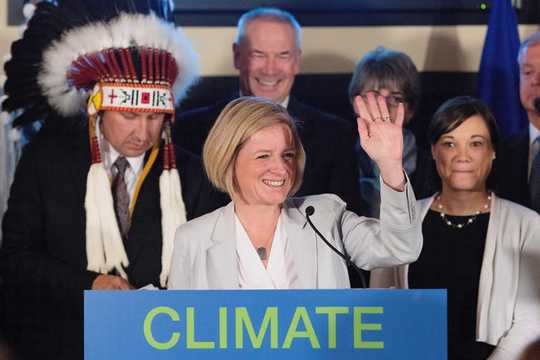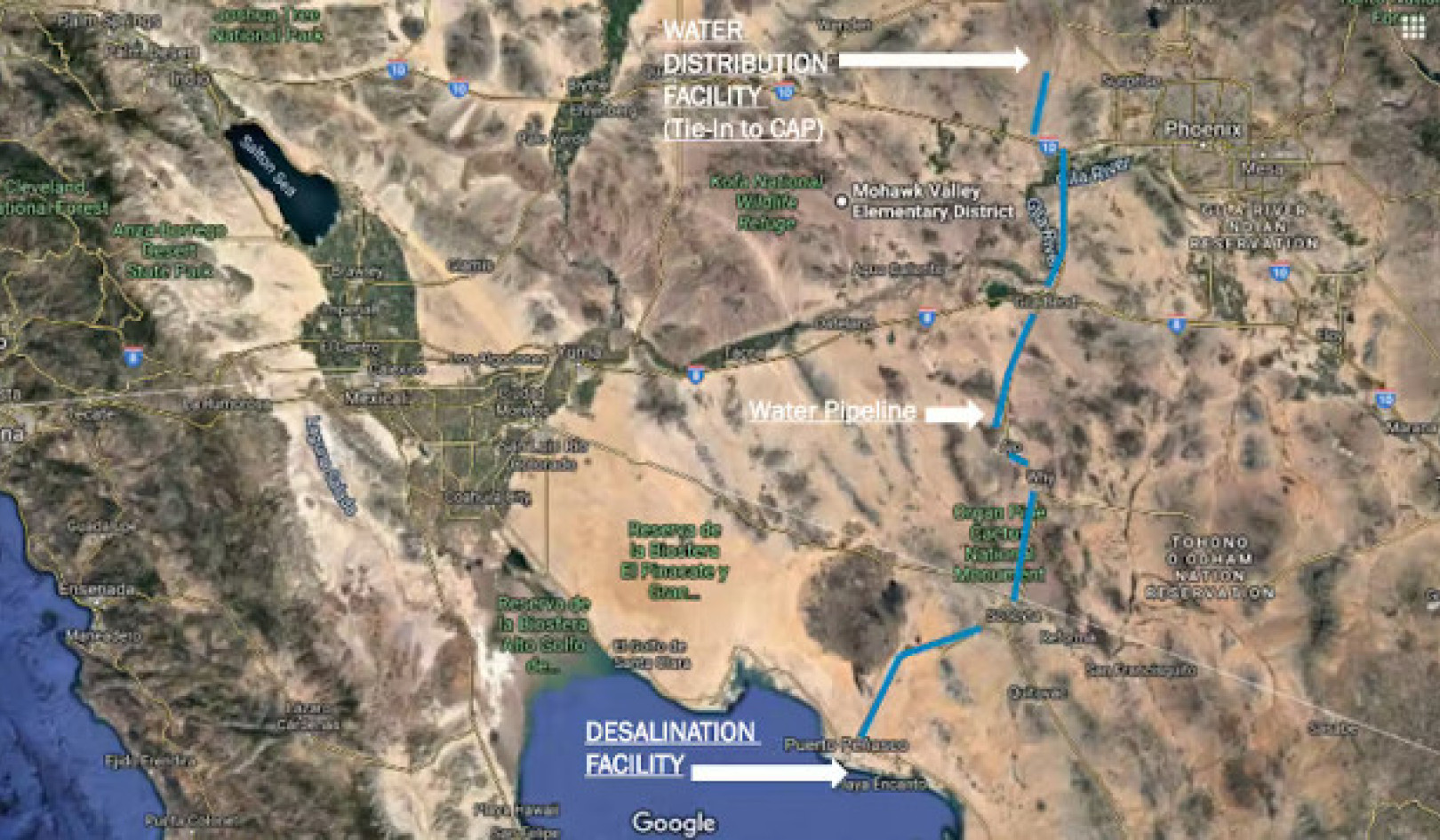 A coal mine near the mountains in Alberta. (Shutterstock)
A coal mine near the mountains in Alberta. (Shutterstock)
“Coal is dead.”
These are not the words of a Greenpeace activist or left-wing politician, but of Jim Barry, the global head of the infrastructure investment group at Blackrock — the world’s largest asset manager. Barry made this statement in 2017, but the writing has been on the wall for longer than that.
Banks know it, which is why they are increasingly unwilling to underwrite new coal mines and power plants. Unions and coal workers know it, which is why they are demanding a just transition and new employment opportunities in the clean economy. Even large diversified mining companies are getting out of the business of coal.
The only ones who seem to have remained in denial are President Donald Trump and non-diversified mining companies like Westmoreland Coal. The Denver-based firm made a bad bet in 2013 when it purchased five coal mines in Alberta. Now it wants Canadian taxpayers to pay for its mistake.
Alberta’s coal phaseout
Three years ago, Alberta’s New Democratic Party (NDP) committed to what some have described as “the most ambitious climate plan in North America to date.” In addition to the development of an economy-wide carbon price, the province is phasing out coal-fired power by 2030. Without the infrastructure to export coal, the climate plan has also resulted in a de facto phaseout of local thermal coal mining.
 Premier Rachel Notley unveils Alberta’s climate strategy in Edmonton on Nov. 22, 2015. THE CANADIAN PRESS/Amber Bracken
Premier Rachel Notley unveils Alberta’s climate strategy in Edmonton on Nov. 22, 2015. THE CANADIAN PRESS/Amber Bracken
To ensure support for the plan, major utility companies in the province were provided with “transition payments” to facilitate the switch to gas and renewable energy. Westmoreland did not receive a government handout, because coal mining companies have no role to play in the energy transition. The company, which filed for bankruptcy protection for its investments in the United States in October, doesn’t think this is fair.
NAFTA’s investment chapter
Because Westmoreland is an American company, it can rely on the North American Free Trade Agreement (NAFTA) for protection from “unfair” treatment. NAFTA allows a foreign investor to use a process known as “Investor-State Dispute Settlement” (ISDS) when government action harms its business in some way.
ISDS allows foreign investors to bypass local courts and bring claims for monetary compensation to an international tribunal. The system is not unique to NAFTA; it is found in other trade agreements like the Comprehensive and Progressive Agreement for Trans Pacific Partnership (CPTPP) and thousands of bilateral investment treaties (known as Foreign Investment Promotion and Protection Agreements in Canada).
ISDS is hugely controversial. Concerns have been raised by a wide range of actors about both the process of ISDS, and the way the system can infringe on the sovereign right of states to regulate to protect public health, human rights and the environment.
More than 900 ISDS cases have been launched by investors since the early 1990s, including 27 against Canada that have so far cost Canadian taxpayers at least $315 million. There is one ongoing dispute that concerns a ban on gas fracking in Québec, but the Westmoreland claim is the first brought in relation to a policy explicitly designed to combat climate change.
Westmoreland argues that part of the reason it invested in Canada in 2013 was to diversify its holdings in response to regulatory risk. At the time, the Obama Administration was taking action under the Clean Power Plan to reduce the reliance of American utilities on coal. The company’s failure to anticipate similar regulatory action by its northern neighbour is remarkable.
A key battleground
If governments respond appropriately to the urgent warning issued by the Intergovernmental Panel on Climate Change (IPCC) in October, efforts to phase out fossil fuels will have to ramp up considerably — and quickly. We should expect the industry to fight these efforts through a variety of means. ISDS may become a key battleground.
 President Donald Trump, Prime Minister Justin Trudeau, right, and President Enrique Pena Nieto, left, participate in the USMCA signing ceremony, Nov. 30, 2018 in Buenos Aires, Argentina. (AP Photo/Pablo Martinez Monsivais)
President Donald Trump, Prime Minister Justin Trudeau, right, and President Enrique Pena Nieto, left, participate in the USMCA signing ceremony, Nov. 30, 2018 in Buenos Aires, Argentina. (AP Photo/Pablo Martinez Monsivais)
The U.S.-Mexico-Canada Agreement (USMCA or CUSMA, depending on who is talking about it), which may replace NAFTA (it has been signed, but has not been ratified), does not retain the process of ISDS between Canada and the U.S.
While this is good news in the long run, some have suggested that there will be a “rush of filings” before access to ISDS for already established investors expires (three years after USMCA comes into force). Canada will also be exposed to claims from investors under other agreements such as the CPTPP and Canada-European Union Comprehensive Economic and Trade Agreement (CETA).
Other countries, particularly poorer nations, face an even higher risk of ISDS claims and have far less resources available to fight them. It is notable that big oil companies have retained some access to ISDS against Mexico in USMCA, after lobbying hard for it.
A climate of fear?
If Westmoreland’s case proceeds to arbitration, it will not have direct implications for Alberta’s climate policy. An investment tribunal cannot require the provincial government to reverse the coal phaseout; it can only award the company damages. Westmoreland is asking for US$470 million. It is the federal government, rather than Alberta, that would have to pay compensation to Westmoreland if the company’s claim was successful. However, Ontario did agree to pay the award in a recent NAFTA case.
What is more concerning than any potential payout is that Westmoreland’s suit could hinder efforts to implement similar plans to combat climate change in other jurisdictions.
“Regulatory chill” is a phenomenon that has been observed in several jurisdictions around the world. A notable example is the decision of the New Zealand government to delay the introduction of legislation to require plain packaging of tobacco products until Australia won its ISDS case against the tobacco company Philip Morris International. This delay of regulatory action — out of fear of expensive litigation — may have cost lives.
As recent forest fires and floods have demonstrated, delays in action to combat climate change can also be deadly.![]()
About The Author
Kyla Tienhaara, Canada Research Chair in Economy and Environment, Queen's University, Ontario
This article is republished from The Conversation under a Creative Commons license. Read the original article.
Related Books
Climate Leviathan: A Political Theory of Our Planetary Future
by Joel Wainwright and Geoff Mann How climate change will affect our political theory—for better and worse. Despite the science and the summits, leading capitalist states have not achieved anything close to an adequate level of carbon mitigation. There is now simply no way to prevent the planet breaching the threshold of two degrees Celsius set by the Intergovernmental Panel on Climate Change. What are the likely political and economic outcomes of this? Where is the overheating world heading? Available On Amazon
How climate change will affect our political theory—for better and worse. Despite the science and the summits, leading capitalist states have not achieved anything close to an adequate level of carbon mitigation. There is now simply no way to prevent the planet breaching the threshold of two degrees Celsius set by the Intergovernmental Panel on Climate Change. What are the likely political and economic outcomes of this? Where is the overheating world heading? Available On Amazon
Upheaval: Turning Points for Nations in Crisis
by Jared Diamond Adding a psychological dimension to the in-depth history, geography, biology, and anthropology that mark all of Diamond's books, Upheaval reveals factors influencing how both whole nations and individual people can respond to big challenges. The result is a book epic in scope, but also his most personal book yet. Available On Amazon
Adding a psychological dimension to the in-depth history, geography, biology, and anthropology that mark all of Diamond's books, Upheaval reveals factors influencing how both whole nations and individual people can respond to big challenges. The result is a book epic in scope, but also his most personal book yet. Available On Amazon
Global Commons, Domestic Decisions: The Comparative Politics of Climate Change
by Kathryn Harrison et al Comparative case studies and analyses of the influence of domestic politics on countries' climate change policies and Kyoto ratification decisions. Climate change represents a “tragedy of the commons” on a global scale, requiring the cooperation of nations that do not necessarily put the Earth's well-being above their own national interests. And yet international efforts to address global warming have met with some success; the Kyoto Protocol, in which industrialized countries committed to reducing their collective emissions, took effect in 2005 (although without the participation of the United States). Available On Amazon
Comparative case studies and analyses of the influence of domestic politics on countries' climate change policies and Kyoto ratification decisions. Climate change represents a “tragedy of the commons” on a global scale, requiring the cooperation of nations that do not necessarily put the Earth's well-being above their own national interests. And yet international efforts to address global warming have met with some success; the Kyoto Protocol, in which industrialized countries committed to reducing their collective emissions, took effect in 2005 (although without the participation of the United States). Available On Amazon
From The Publisher:
Purchases on Amazon go to defray the cost of bringing you InnerSelf.comelf.com, MightyNatural.com, and ClimateImpactNews.com at no cost and without advertisers that track your browsing habits. Even if you click on a link but don't buy these selected products, anything else you buy in that same visit on Amazon pays us a small commission. There is no additional cost to you, so please contribute to the effort. You can also use this link to use to Amazon at any time so you can help support our efforts.
























